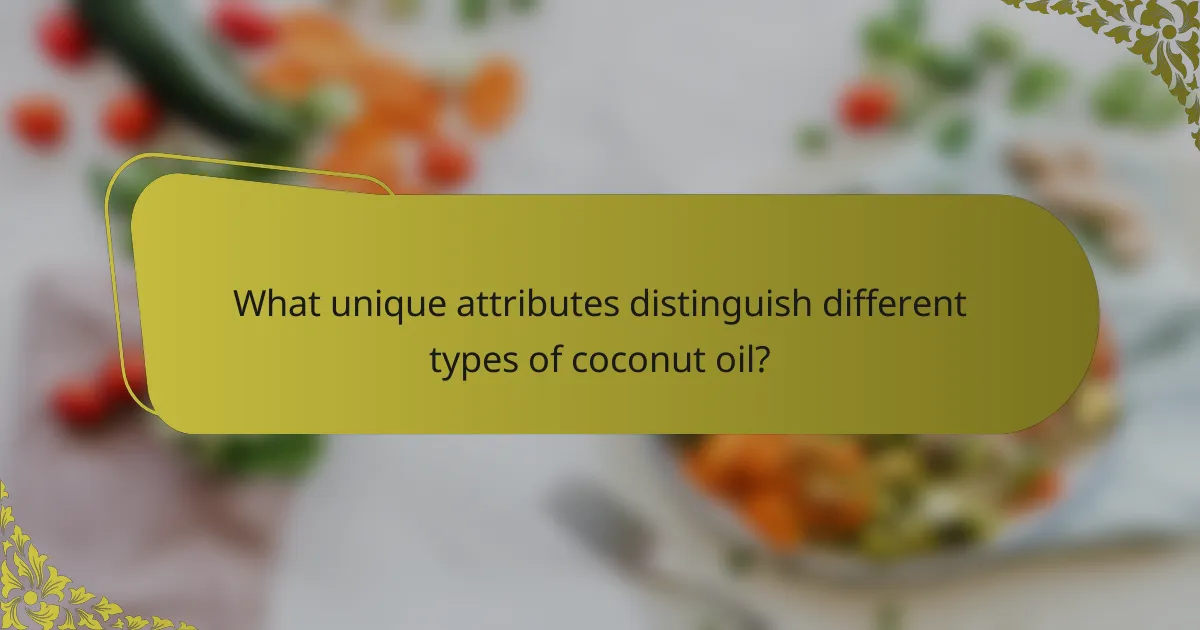Coconut oil offers significant health benefits, including improved heart health and enhanced metabolism. It is versatile in culinary uses, serving as a cooking oil and baking ingredient. The nutritional profile highlights its medium-chain triglycerides and vitamin E content. Additionally, coconut oil has unique applications, such as natural makeup remover and hair mask.

What are the health benefits of coconut oil?
Coconut oil offers numerous health benefits, including improved heart health, enhanced metabolism, and antimicrobial properties. It contains medium-chain triglycerides (MCTs), which may aid in weight management by increasing energy expenditure. Additionally, coconut oil can support skin health and provide a natural moisturizer. Its unique attribute is lauric acid, known for its antiviral and antibacterial effects.
How does coconut oil support heart health?
Coconut oil supports heart health primarily through its medium-chain triglycerides (MCTs), which can improve cholesterol levels. MCTs may raise high-density lipoprotein (HDL) cholesterol, known as “good” cholesterol, while potentially lowering low-density lipoprotein (LDL) cholesterol, often termed “bad” cholesterol. Research indicates that incorporating coconut oil into a balanced diet can enhance cardiovascular health by promoting better lipid profiles. Additionally, its anti-inflammatory properties may contribute to overall heart health.
Can coconut oil improve skin conditions?
Coconut oil can improve skin conditions due to its moisturizing properties and antimicrobial effects. It contains fatty acids that can enhance skin barrier function and reduce inflammation. Research shows that coconut oil is effective in treating conditions like eczema and dermatitis, providing relief and improving skin health. Its unique attribute, lauric acid, contributes to its antibacterial properties, making it beneficial for acne-prone skin.
What role does coconut oil play in weight management?
Coconut oil can aid weight management by increasing metabolism and promoting fat oxidation. Its medium-chain triglycerides (MCTs) are rapidly absorbed and used for energy, potentially reducing fat storage. Studies suggest that incorporating coconut oil can enhance feelings of fullness, which may lead to lower overall calorie intake. Additionally, coconut oil’s unique fatty acid composition differentiates it from other oils, providing distinct metabolic benefits.

How is coconut oil used in culinary applications?
Coconut oil is widely used in culinary applications due to its versatility and unique flavor. It serves as a cooking oil, a baking ingredient, and a dairy substitute.
1. Cooking: Coconut oil is ideal for frying and sautéing because of its high smoke point of around 350°F (177°C).
2. Baking: It adds moisture and a subtle coconut flavor to baked goods.
3. Dairy Substitute: Coconut oil can replace butter or margarine in recipes, making it suitable for vegan diets.
4. Salad Dressings: It can be used in dressings for added richness.
5. Smoothies: Coconut oil enhances the creaminess and provides healthy fats.
6. Flavor Enhancer: It complements tropical dishes and enhances the overall taste profile.
Which dishes can benefit from coconut oil?
Coconut oil enhances various dishes with its unique flavor and health benefits. It is particularly beneficial for stir-fries, baked goods, curries, smoothies, and salad dressings. The oil’s high smoke point makes it ideal for high-heat cooking, while its rich, creamy texture adds depth to recipes. Additionally, coconut oil can replace butter or other oils, contributing healthy fats to meals.
What are the best methods for cooking with coconut oil?
Coconut oil can be cooked using methods like frying, baking, and sautéing. These methods enhance flavor and retain nutrients.
1. Frying: Ideal for high-heat cooking, coconut oil has a smoke point of about 350°F, making it suitable for frying foods.
2. Baking: Use coconut oil as a substitute for butter or other oils in recipes, adding a subtle coconut flavor to baked goods.
3. Sautéing: Perfect for vegetables and proteins, coconut oil adds richness while allowing for even cooking and browning.
4. Roasting: Coat vegetables or meats with coconut oil before roasting for a crispy texture and enhanced taste.
5. Spreading: Use solid coconut oil as a spread on toast or in smoothies for added health benefits.

What is the nutritional profile of coconut oil?
Coconut oil is high in saturated fats and contains medium-chain triglycerides (MCTs) that provide energy. It has about 117 calories per tablespoon and is free of carbohydrates and proteins. Key nutrients include vitamin E and antioxidants, contributing to its health benefits.
How does the fatty acid composition of coconut oil compare to other oils?
Coconut oil has a unique fatty acid composition compared to other oils, primarily consisting of medium-chain triglycerides (MCTs) like lauric acid. This composition provides different health benefits and metabolic effects than oils high in long-chain fatty acids. For example, coconut oil contains approximately 62% MCTs, while olive oil primarily consists of monounsaturated fats.
| Oil Type | Fatty Acid Composition | Key Attributes |
|—————-|——————————-|————————————-|
| Coconut Oil | 62% MCTs, 38% other fats | Quick energy source, antimicrobial |
| Olive Oil | 73% monounsaturated fats | Heart-healthy, anti-inflammatory |
| Canola Oil | 62% polyunsaturated fats | Lowers cholesterol, versatile |
| Palm Oil | 50% saturated fats | Stable at high temperatures |
| Avocado Oil | 70% monounsaturated fats | Nutrient absorption, skin benefits |
What vitamins and minerals are present in coconut oil?
Coconut oil contains minimal vitamins and minerals, primarily vitamin E and small amounts of vitamin K. Its nutritional profile mainly consists of saturated fats, with no significant amounts of other essential nutrients.

What unique attributes distinguish different types of coconut oil?
Different types of coconut oil are distinguished by their extraction methods and processing. Virgin coconut oil retains more nutrients and has a stronger coconut flavor, while refined coconut oil has a neutral taste and higher smoke point.
| Type | Extraction Method | Flavor Profile | Smoke Point | Nutrient Retention |
|———————|———————-|———————–|————-|———————|
| Virgin Coconut Oil | Cold-pressed | Strong coconut flavor | 350°F | High |
| Refined Coconut Oil | Heat-processed | Neutral | 450°F | Moderate |
| Extra Virgin Coconut Oil | Cold-pressed | Intense coconut taste | 350°F | Very High |
| Organic Coconut Oil | Various methods | Mild coconut flavor | 400°F | High |
How do refined and unrefined coconut oil differ in quality?
Refined coconut oil undergoes processing that removes impurities, resulting in a neutral flavor and higher smoke point. Unrefined coconut oil retains its natural flavor and nutrients, making it more aromatic and suitable for health-conscious cooking. The choice between them depends on culinary needs and health preferences.
What are the sourcing practices for high-quality coconut oil?
Sourcing practices for high-quality coconut oil prioritize organic, sustainably harvested coconuts. Farmers often use traditional methods, ensuring minimal processing to retain nutrients. Certification from reputable organizations guarantees quality and ethical practices. Additionally, cold-pressed extraction is favored to preserve flavor and health benefits.

What are some rare uses of coconut oil that people may not know?
Coconut oil has several rare uses that many people may not be aware of. It can serve as a natural makeup remover, effectively dissolving cosmetics without harsh chemicals. Additionally, coconut oil can be used as a wood conditioner, restoring shine and preventing drying on wooden furniture. Another unique application is its use in oil pulling, a traditional oral health practice that may reduce harmful bacteria in the mouth. Coconut oil can also be utilized as a natural insect repellent, providing a chemical-free alternative to commercial products. Lastly, it can act as a hair mask, deeply moisturizing and promoting shine, especially for dry or damaged hair.
How can coconut oil be utilized in natural beauty products?
Coconut oil can be utilized in natural beauty products for its moisturizing, antibacterial, and antioxidant properties. It serves as an effective base for lotions, hair conditioners, and lip balms. The fatty acids in coconut oil nourish skin and hair, promoting hydration and softness. Additionally, its unique attribute of being non-comedogenic makes it suitable for various skin types.
What unconventional health uses of coconut oil are emerging?
Coconut oil is gaining attention for unconventional health uses beyond cooking. Emerging applications include skin moisturization, hair conditioning, and antimicrobial properties. Research suggests coconut oil may aid in wound healing and reduce inflammation, making it a versatile health ally. Its unique fatty acid composition, particularly lauric acid, contributes to these benefits.
What are the best practices for storing coconut oil?
Store coconut oil in a cool, dark place to maintain its quality. Use an airtight container to prevent oxidation and contamination. Avoid exposure to heat and light, which can degrade the oil over time. If stored properly, coconut oil can last up to two years.
What common mistakes should be avoided when using coconut oil?
Common mistakes to avoid when using coconut oil include overheating it, using it as a sole cooking fat, neglecting its smoke point, and assuming all coconut oil is the same quality. Overheating can degrade its beneficial properties. Relying solely on coconut oil may lead to an unbalanced diet, as it lacks essential fatty acids. Its smoke point is around 350°F, and exceeding this can produce harmful compounds. Lastly, not all coconut oil is organic or cold-pressed, which can impact its health benefits.
